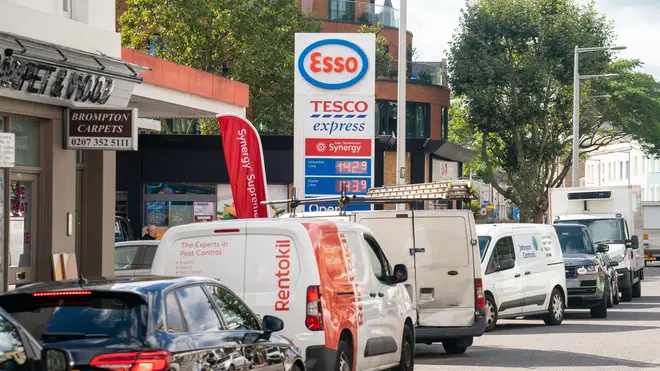
Iain Dale 7pm - 10pm
29 September 2021, 19:54

The Petrol Retailers Association said pressure at the pumps is ‘easing’ but staff face high levels of verbal and physical abuse.
Petrol station staff are being subjected to “unacceptable” levels of abuse, the industry has warned, despite a continued easing of pressure on the forecourts.
The Petrol Retailers Association (PRA) said its latest survey of its members found just over one-in-four had run dry, down from more than a third on Tuesday.
Ministers said they expected the situation to improve further, with the first troops driving tankers expected to appear on the roads “in the next couple of days”.
But despite the appeals to the motorists to fill up as normal, PRA executive director Gordon Balmer said forecourt staff were being subjected to a “high level” of both physical and verbal abuse from frustrated motorists.
I can confirm the government's Reserve Tanker Fleet will be on the road this afternoon to boost deliveries of fuel to forecourts across Britain.
The trucks are driven by civilians and will provide additional logistical capacity to the fuel industry (1/2)
— Kwasi Kwarteng (@KwasiKwarteng) September 29, 2021
“There are encouraging signs that the crisis at the pumps is easing, with forecourts reporting that they are taking further deliveries of fuel,” he said.
“However, we are extremely disappointed to hear many forecourt staff are experiencing a high level of both verbal and physical abuse, which is completely unacceptable.”
His warning comes amid reports of fights breaking out on forecourts with, in one case, footage appearing on social media of a man wielding a knife, as tempers boiled over during the long waits to fill up.
Earlier, Business Secretary Kwasi Kwarteng said the situation appeared to be “stabilising” with most people “behaving quite responsibly”.

As well as deploying troops, he said the Government was sending out vehicles from its reserve tanker fleet, driven by civilian drivers, to provide “additional logistical capacity” to the industry.
“It takes, sometimes, a few days to get troops on the ground.
“We have decided to do that.
“I think in the next couple of days you will see some soldiers driving tankers,” he said in a pooled clip for broadcasters.
Altogether 150 military drivers, together with 150 drivers’ mates, have been on standby since Monday to carry out deliveries to filling stations.
It followed reports that a shortage of tanker drivers was threatening supplies, prompted a wave of panic buying, with long queues for petrol and filling stations running dry.
In a joint statement following talks with Mr Kwarteng, representatives of the fuel industry welcomed the deployment of the reserve tankers and echoed his optimism the situation would continue to stabilise.
The signatories, including Shell, Esso and BP, said: “While there has always been plenty of fuel at our refineries and terminals, we are also now seeing signs that the situation at the pumps has begun to improve.”
AA president Edmund King said on Wednesday evening their evidence suggested the pressure at the pumps was easing, with a significant drop in members with “our of fuel” breakdowns.
He said: “From speaking to patrols and employees, many of the garages we observed with queues yesterday, were generally functioning well today and still had fuel. In general terms, London and the South East have been hit hardest and very few problems were seen in Scotland or Northern Ireland.
“We still urge drivers to stick to their normal refuelling patterns and not rush to top up. We have had reports of drivers dribbling in £1.72p worth of petrol and £2.05 of diesel which is pretty counter-productive as they would had used those amounts searching for fuel.”
Despite the assurances from ministers, Steve McNamara, general secretary of the Licensed Taxi Drivers Association in London, said there was little sign of the situation improving on the ground.
“Contrary to Boris Johnson’s wish list, it is not getting better,” he told the BBC Radio 4 Today programme.
“The situation is that 25% to 30% of our members were not at work yesterday, and unable get fuel to go to work, and a taxi driver without fuel is unemployed.”
Meanwhile the retail fashion giant Next said shortages would continue to plague the wider economy in the run-up to Christmas unless the Government took action to address the “looming skills crisis”.
It said the shortage of HGV drivers had been “widely predicted for many months” and called on ministers to relax the immigration rules to avoid further shortfalls.
“We anticipate that, without some relaxation of immigration rules, we are likely to experience some degradation in our service in the run-up to Christmas,” it said.
“For the sake of the wider UK economy, we hope that the Government will take a more decisive approach to the looming skills crisis in warehouses, restaurants, hotels, care homes and many seasonal industries.
“A demand-led approach to ensuring the country has the skills it needs is now vital.”
The call came as figures from the Department for Transport showed there was a backlog of more than 56,000 applications for vocational driving licences, including HGV and bus, permits waiting to be processed.
Ministers have blamed the pandemic which led to the cancellation last year of tens of thousands of tests.